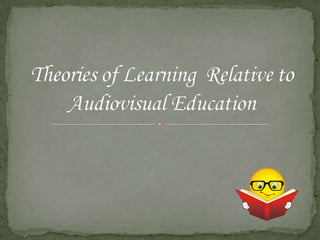
Ed teach (my report)
- 2. The process of learning is an individual experience for each person. Learning takes place whenever an individual’s behavior is modified-when a person thinks or acts differently, when he or she has acquired new knowledge or a new skill. Since a major purpose for preparing instructional media is to effect behaviors that serve objectives, it is appropriate to turn to the psychology of learning for help in locating principles that would guide the planning of effective instructional media.
- 3. A number of major theories have influenced psychology and education. They have received much attention from practitioners since the mid-twentieth century. Brief overviews of eight important theories are considered here.
- 4. The theory of operant conditioning is build on Skinner’s view that learning is behavioral change (Skinner,1954). Behavior is the result of an individual’s response to events taking place in one’s environment. These are the stimuli(message),which elicit responses(learning) in the learner. A response produces a consequence, such as defining words, solving a math problem, or writing a chemical formula. Operant conditioning is applied when the microcomputer is used to teach basic skills like identification, discrimination, and problem solving, often in drills and practice programs.
- 5. (Gagne, 1985). Basic information or simple skills that are learned contribute to the learning of more complex knowledge and skills. Gagne categories of learning: 1.Verbal information-learning names, dates, definition, and facts, which provide basic terminology relating to the topic. 2.Intellectual skills- learning how to use verbal information through discriminations, grouping facts with common features. 3.Motor skills- performing physical skills and behaviors to ward persons, objects, and events.
- 6. The component display theory(Merrill) provides more details for designing specific instructional sequences than does Gagne theory of conditions of learning. It classifies outcomes of learning in two dimensions: Content (facts, concepts, procedures, and principles) Performance (remembering, using, and finding, a generality). Then, in the delivery of instruction, this theory gives attention to: Primary presentation forms-expository presentation of both a generality(a rule)and an instance(an example), inquisitory generality (recall), and inquisitory instance (practice) Secondary presentation forms-prerequisite material, attention- focusing help, mnemonics and feedback.
- 7. In teaching a procedure, the most simple and representative applications is taught first. Subsequent lessons add further conditions and details to the original presentation until the degree of complexity required by the objective is attained. Furthermore, elaborations that relate to more than a single idea or concept of new knowledge are more effective in enhancing learning. Also, at each step in this elaboration process the learner is reminded of the procedure as a whole.
- 8. The mental processes whereby human beings perceive, organize, and remember the great amount of information receive daily have been the subject of information-processing research (Norman).a basic premise of this work is that the human brain is a complex , active organ for processing information . It follows that how an individual selects, encodes, and stores information relates to one’s learning ability.
- 9. In social learning theory, attention is given to personality factors and the interactions among people (Bandura). This theory explains that certain learning takes place through the ability of individuals to observe the behaviors of other persons (serving as models). This allows them to make choices among these behaviors, which they adapt for themselves (modelling) to emulate.
- 10. Attribution learning theory seeks to identify ways by which individuals seek understandings for events taking place in their world(Weiner). It is built on cognitive processes – meaningfulness, understanding, and organizational abilities- considered to be fundamental characteristics of human behavior. The term attribution refers to an inference made by a person about the causes of an event or of a particular outcomes. Major attributions: Ability- feelings of confidence or incompetence , or of pride or shame Effort- feelings of pride for success Luck- no change in success expectancy Task difficulty- no enhancement of self-esteem for success outcomes.
- 11. Finally, as an aspect of learning theory, we consider the topic of motivation. Motivation has both direction and magnitude components, and its level is evidenced by the intensity of performance toward completion of a learning task. Keller (1983)has identified four conditions for successful motivation : Interest-arousing and sustaining the learner’s curiosity and attention. Relevance-relating the instruction to how a learner can satisfy personal needs or a highly desired goal. Expectancy (confidence)-perceiving the likelihood of successes in learning and the extent to which success is under learning control. Satisfactory-combining extrinsic reward and intrinsic motivation to influence the accomplishment of the instructional goal and provide further motivation to continue pursuing similar goal.
